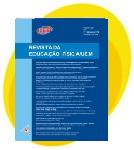<b>Flow in volleyball: relationship with motivation, self-efficacy, perceived ability and goal orientation</b> - doi: 10.4025/reveducfis.v23i3.17024
Abstract
The purpose of this study was to investigate the relationship between the flow and the forms of motivation established for the theory of self-determination, self-efficacy, perceived ability and goal orientation. Participants were males volleyball players who responded to the following instruments: Demographic Evaluation, Sports Motivation Scales, Task Ego Orientation in Sport Scale, Self-efficacy for Volleyball Single Scale, Perceived Ability, and Perceptual Flow Scales. Data were collected in three games. The results showed that the average flow of the athletes were low. There was a negative relationship with the components of extrinsic motivation and amotivation, and a positive relationship between the flow and self-efficacy in the second phase, and between flow and perceived ability in the second and third phases of the study. Regarding the orientation task, the relationship was negative in the second phase and positive in the third stage games, state and regional championships, respectively.
Downloads
Metrics
• Authors retain the copyright and full publishing rights without restrictions.

This work is licensed under a Creative Commons Attribution 4.0 International License.









_1502.jpg)











